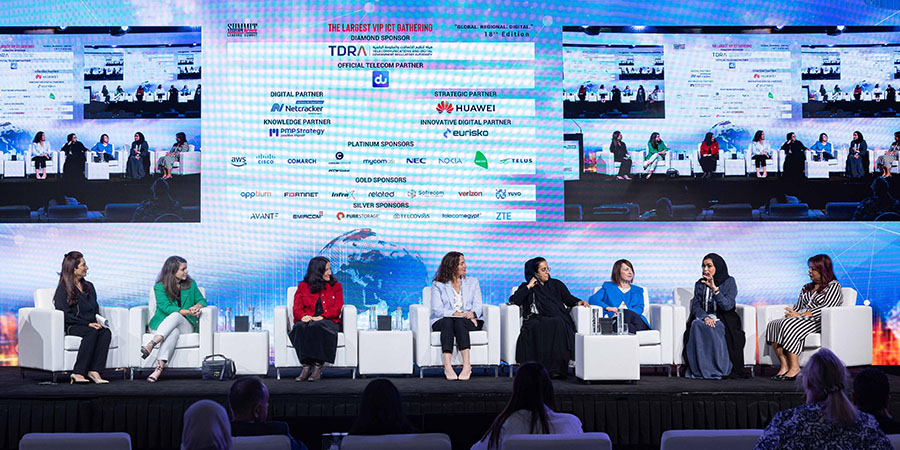In recent years, women have made valuable contributions to the ICT industry, delivering innovative solutions and driving technological advancements. At the 18th edition of the Telecom Review Leaders’ Summit, the panel ‘Women in ICT’ brought together a distinguished lineup of leaders who shared insights into the evolving role of women in the ICT sector.
Moderated by Shazia Sobani, Vice President of Fibre Networks at TELUS, the panelists included Chrystelle Briantais, Partner at PMP Strategy; Najla Al Kaabi, Acting Head of AI at du; Jennifer Parkhill, Senior Director of Strategy Execution and Program Management at Verizon Partner Solutions; Gina Perini, CEO of Somos; Dr. Lidia Stępińska-Ustasiak, President and Co-Founder of Polistratos Institute; Dalia El Gezery, Chief HR and Administration Officer at e& Egypt; and Nada Al Fardan, Consumer Affairs Manager at TDRA UAE.
The Journey to Bridging the Gender Gap
In a male-dominated ICT industry, women are often underrepresented and encounter barriers to entry, leadership, and advancement.
Opening the session, Sobani noted that a USD 12 trillion value is possible if gender parity is delivered in the ICT sector, and organizations will experience 27% higher profitability when gender wealth is achieved.
The panel explored the current state of gender equality in the ICT sector, acknowledging progress made while highlighting areas that still require attention.
When asked about the current state of gender equality in ICT, TDRA’s Al Fardan reaffirmed the remarkable progress made in bridging the gender gap in the industry, particularly in the UAE. In addition, she noted that females represent 56% of the UAE’s science, technology, engineering, and mathematics (STEM) graduates.
Despite agreeing with the significant progress made in gender parity, Verizon’s Parkhill underscored that there is still more work that needs to be done to bridge the gap. “Looking at ways for us to mentor and co-sponsor young females coming through so we can develop that pipeline of talent is one of the main reasons for us being here,” she emphasized.
Perini elaborated on the importance of embedding diversity into core business strategies. She warned against treating diversity initiatives as standalone efforts, which risk being side-lined during organizational challenges. Instead, she advocated for systemic integration, where gender parity becomes a fundamental business priority.
“Creating an inclusive culture benefits everyone,” Perini remarked. “It fosters creativity, problem-solving, and open communication—all essential for the ICT sector’s dynamic landscape.”
Europe, too, has taken significant steps toward gender parity, with mandates requiring at least 30% female representation on corporate boards and leadership positions. These frameworks, coupled with the European Strategy for Gender Equality 2025, encourage private-sector strategies and cross-sectoral collaborations to drive sustained change.
Gender Equality at the Core of Business Strategies
The discussion underscored the importance of inclusive policies and practices to ensure equal opportunities for women. The panelists emphasized the growing influence of women leaders in ICT, showcasing how their contributions are driving innovation, shaping strategy, and inspiring future generations.
Somos Inc.’s Perini highlighted the significance of incorporating diversity into core business strategies and creating leadership pipelines for women.
Polistratos Institute’s Stępińska-Ustasiak also underscored the importance of creating new frameworks to establish new patterns for strategies in the private sector.
Challenges such as gender bias, gaps in representation, and barriers to advancement were openly discussed. The panelists shared their experiences in overcoming these hurdles, for example, El Gezery noted that her father’s influence shaped her current role, pushing her to start a career in the ICT field, and consequently encourage more women to do the same.
The panelists also addressed the persistent challenges women face in advancing their ICT careers. From mid-career drop-offs and limited access to leadership opportunities, systemic barriers continue to hinder progress. Strategies discussed included:
- Mentorship and Sponsorship: Creating robust mentorship programs to support women at different career stages.
- Policy Interventions: Governments and corporations implementing frameworks that mandate and incentivize gender parity.
- Leadership Development: Establishing programs that prepare women for executive roles and address challenges unique to their journeys.
- Cultural Shifts: Fostering workplaces that value inclusivity and actively challenge biases.
Driving More Female Talent in the ICT Industry
The UAE ranks first regionally and seventh globally on the UN’s Gender Inequality Index, reflecting its commitment to empowering women. Initiatives like the National Strategy for Emirati Women and policies supporting STEM education have propelled Emirati women into prominent roles, including the ICT sector, where they now comprise more than 50% of the workforce.
Meanwhile, Parkhill highlighted North America’s progress, emphasizing the importance of mentorship across the U.S. Despite measurable improvements, she stressed the need for systemic approaches to ensure representation translates into meaningful influence.
The session also conferred personal stories of triumph and leadership from the panelists, illustrating the transformative impact of women in the ICT industry. Their journeys served as inspiration and a call to action for continued efforts toward gender parity. With artificial intelligence (AI) gaining momentum globally, golden opportunities are on the horizon.
du’s Al Kaabi highlighted the need for inclusivity in the working environment, especially in an era dominated by AI that’s skills specific. She ironically and humorously noted that, in the next 5-10 years, she wanted to see a “Men in ICT” panel advocating for similar representation.
The panelists unanimously agreed that impact is essential for achieving success and that women’s contributions add depth to the sector’s value.










